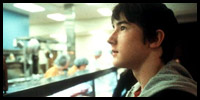
 |
|
Elephant (2003) Cast: Alex Frost, John Robinson, Elias McConnell, Eric Deulen, Kristen Hicks, Jordan Taylor, Brittany Mountain, Nicole George, Nathan Tyson, Carrie Finklea, Alicia Miles, Timothy Bottoms, Matt Malloy, Bennie Dixon, Chantelle Chriestenson, Caroline Donovan Boyd, Wolfgang Williams 2003 – 81 minutes Rated: Reviewed by Dustin Putman, May 6, 2004.  Only the second film in the last year to elicit enough passion in me to write a review following its home video and DVD release (the other was 2003's best picture, "May"), "Elephant" is the unshakably disturbing, nerve-rattling masterpiece from writer-director Gus Van Sant (1995's 'To Die For," 1998's "Psycho") that won the Palme D'Or and Best Director prizes at the 2003 Cannes Film Festival. A fictional, but eerily reminiscent telling of the 1999 Columbine tragedy—the worst school shooting in American history—"Elephant" manages the difficult feat of finding the profound in the seemingly mundane, beauty in the most unlikely of places, and human complexity in its most naked and raw of forms. It is a film that says so very much—about the frailty and unpredictability of life, the unintentional ignorance of people for what is right under their noses, the impact a single small event or decision can have on another's or their own future—with the unrushed, unblemished, exquisite simplicity that only a master filmmaker can achieve.
Only the second film in the last year to elicit enough passion in me to write a review following its home video and DVD release (the other was 2003's best picture, "May"), "Elephant" is the unshakably disturbing, nerve-rattling masterpiece from writer-director Gus Van Sant (1995's 'To Die For," 1998's "Psycho") that won the Palme D'Or and Best Director prizes at the 2003 Cannes Film Festival. A fictional, but eerily reminiscent telling of the 1999 Columbine tragedy—the worst school shooting in American history—"Elephant" manages the difficult feat of finding the profound in the seemingly mundane, beauty in the most unlikely of places, and human complexity in its most naked and raw of forms. It is a film that says so very much—about the frailty and unpredictability of life, the unintentional ignorance of people for what is right under their noses, the impact a single small event or decision can have on another's or their own future—with the unrushed, unblemished, exquisite simplicity that only a master filmmaker can achieve.
 "Elephant" takes an intoxicatingly non-traditional path in unweaving its narrative. Set almost entirely on a single day at an Oregon high school (and, when you stop to think about it, in the same 10-minute period leading up to an unexpected and deadly school massacre), the picture follows one character, or set of characters, as they go about their day, until it changes viewpoints and follows a different person. Sometimes their lives directly intersect, wrapping around a timeline and coming full circle, and sometimes they pass each other without either party noticing. As the leading roles mount, the floor plan and architecture of the school vividly etched, and more information is disclosed, it gradually becomes clear exactly when the shootings are about to take place. The characters, however, have no way of knowing. And when one gossipy teenage girl jokingly tells her two friends, "I just want to survive to see my driver's license," she has no idea just how prophetic and dire her words actually are.
"Elephant" takes an intoxicatingly non-traditional path in unweaving its narrative. Set almost entirely on a single day at an Oregon high school (and, when you stop to think about it, in the same 10-minute period leading up to an unexpected and deadly school massacre), the picture follows one character, or set of characters, as they go about their day, until it changes viewpoints and follows a different person. Sometimes their lives directly intersect, wrapping around a timeline and coming full circle, and sometimes they pass each other without either party noticing. As the leading roles mount, the floor plan and architecture of the school vividly etched, and more information is disclosed, it gradually becomes clear exactly when the shootings are about to take place. The characters, however, have no way of knowing. And when one gossipy teenage girl jokingly tells her two friends, "I just want to survive to see my driver's license," she has no idea just how prophetic and dire her words actually are.
 As the film opens, a car weaves down a residential street, knocking off a parked car's side mirror and coming dangerously close to running into a telephone pole. The passenger is John (John Robinson), fed up that his dad (Timothy Bottoms) is drunk again and he's going to be late to school. The event is a harbinger of doom, and John doesn't yet realize that his father's reckless driving is the least of his impending problems. Once at school, John calls his brother to come pick his dad up, and is then caught by the principal (Matt Malloy) and sentenced to detention. Other characters gradually enter the frames before taking them over. Nathan (Nathan Tyson), a studly jock who doesn't notice a girl's fawning when he passes her in the hallway, leaves gym class and meets up with girlfriend Carrie (Carrie Finklea). Together, they go to the main office to get written out-of-school passes—passes they will not be able to use. Daydreamer Michelle (Kristen Hicks) is cornered by her gym teacher, who asks her why she refuses to wear shorts like the rest of the girls, before heading off to the locker room to get changed. She is late for her volunteer work at the school library during her lunch period. Aspiring photographer Elias (Elias McConnell) takes pictures of two passing classmates before school, promising them copies when he has the roll exposed. He then trudges off to the darkroom to work on his photos. And Jordan (Jordan Taylor), Nicole (Nicole George), and Brittany (Brittany Mountain) chat and gossip as they go to get lunch in the cafeteria before diligently heading to the bathroom to throw it up.
As the film opens, a car weaves down a residential street, knocking off a parked car's side mirror and coming dangerously close to running into a telephone pole. The passenger is John (John Robinson), fed up that his dad (Timothy Bottoms) is drunk again and he's going to be late to school. The event is a harbinger of doom, and John doesn't yet realize that his father's reckless driving is the least of his impending problems. Once at school, John calls his brother to come pick his dad up, and is then caught by the principal (Matt Malloy) and sentenced to detention. Other characters gradually enter the frames before taking them over. Nathan (Nathan Tyson), a studly jock who doesn't notice a girl's fawning when he passes her in the hallway, leaves gym class and meets up with girlfriend Carrie (Carrie Finklea). Together, they go to the main office to get written out-of-school passes—passes they will not be able to use. Daydreamer Michelle (Kristen Hicks) is cornered by her gym teacher, who asks her why she refuses to wear shorts like the rest of the girls, before heading off to the locker room to get changed. She is late for her volunteer work at the school library during her lunch period. Aspiring photographer Elias (Elias McConnell) takes pictures of two passing classmates before school, promising them copies when he has the roll exposed. He then trudges off to the darkroom to work on his photos. And Jordan (Jordan Taylor), Nicole (Nicole George), and Brittany (Brittany Mountain) chat and gossip as they go to get lunch in the cafeteria before diligently heading to the bathroom to throw it up.
 And then there is Alex (Alex Frost) and Eric (Eric Deulen), outsiders who, earlier, ordered a gun online. Alex is seen having spitballs thrown viciously at him in science class. When a classmate notices him taking notes in the cafeteria and asks what he is doing, his response is casual and foreboding: "You'll see." Alex plays Beethoven on the piano while Eric passes the time with a violent computer game. They watch a documentary on Hitler with a lazy detachment. And on the morning of the shooting, they eat breakfast at Alex's house and his mother's last words to him are, "Don't forget to lock up." Before leaving, his father tells him they might go duck-hunting on the weekend, and Eric rolls his eyes at Alex, whose parents are oblivious to what their son is about to do.
And then there is Alex (Alex Frost) and Eric (Eric Deulen), outsiders who, earlier, ordered a gun online. Alex is seen having spitballs thrown viciously at him in science class. When a classmate notices him taking notes in the cafeteria and asks what he is doing, his response is casual and foreboding: "You'll see." Alex plays Beethoven on the piano while Eric passes the time with a violent computer game. They watch a documentary on Hitler with a lazy detachment. And on the morning of the shooting, they eat breakfast at Alex's house and his mother's last words to him are, "Don't forget to lock up." Before leaving, his father tells him they might go duck-hunting on the weekend, and Eric rolls his eyes at Alex, whose parents are oblivious to what their son is about to do.
 "Elephant" is a startling, uncompromising motion picture of immense power and poeticism. Director Gus Van Sant does not take the high-and-mighty road of even beginning to explain why Alex and Eric do what they do in the third act. He simply doesn't know, and it would be impossible to pinpoint one concrete reason that caused them to snap. For the questions it delicately poses, and for the answers that are never given, Van Sant has constructed one of the most thought-provoking and important films of the last few years. The responsibility he offers up with opened arms in getting this story told is telling. The film does not second guess any of its characters, because it hardly has time to; many of their lives are cut short before they have a chance to even think about it. The film does not create false crises and melodrama just to pump up the plot; the people are just going through the motions of their everyday lives at school, unaware of the danger before them.
"Elephant" is a startling, uncompromising motion picture of immense power and poeticism. Director Gus Van Sant does not take the high-and-mighty road of even beginning to explain why Alex and Eric do what they do in the third act. He simply doesn't know, and it would be impossible to pinpoint one concrete reason that caused them to snap. For the questions it delicately poses, and for the answers that are never given, Van Sant has constructed one of the most thought-provoking and important films of the last few years. The responsibility he offers up with opened arms in getting this story told is telling. The film does not second guess any of its characters, because it hardly has time to; many of their lives are cut short before they have a chance to even think about it. The film does not create false crises and melodrama just to pump up the plot; the people are just going through the motions of their everyday lives at school, unaware of the danger before them.
 Further adding to the realism of "Elephant" is the cast Van Sant has assembled. All of the teenage characters are real teenagers, Portland, Oregon high schoolers with no prior acting experience. The sparse dialogue seems to have been entirely improvised, and the way the teens interact and talk to each other has an unblinking naturalism that one could likely never find with trained professionals. You believe them in their roles because you expect that most of them share distinct characteristics with their characters, and have first-hand knowledge of what their droning, uneventful high school days are really like. Meanwhile, the remarkable cinematography by Harris Savides is in constant motion, taking on a dreamlike quality as the camera smoothly drifts down hallways and dollies behind its characters as they go from one school activity to the next. The music score and subtle sound effects, such as birds chirping in the background and approaching thunder, are deeply evocative, only aiding to raise unbearable tension as one awaits the inevitable to break apart these people's falsely assumed safe existences.
Further adding to the realism of "Elephant" is the cast Van Sant has assembled. All of the teenage characters are real teenagers, Portland, Oregon high schoolers with no prior acting experience. The sparse dialogue seems to have been entirely improvised, and the way the teens interact and talk to each other has an unblinking naturalism that one could likely never find with trained professionals. You believe them in their roles because you expect that most of them share distinct characteristics with their characters, and have first-hand knowledge of what their droning, uneventful high school days are really like. Meanwhile, the remarkable cinematography by Harris Savides is in constant motion, taking on a dreamlike quality as the camera smoothly drifts down hallways and dollies behind its characters as they go from one school activity to the next. The music score and subtle sound effects, such as birds chirping in the background and approaching thunder, are deeply evocative, only aiding to raise unbearable tension as one awaits the inevitable to break apart these people's falsely assumed safe existences.
 When the shootings erupt during the final twenty minutes, the movie avoids exploitation but still goes for the jugular. The violence is abrupt and depressing when a director with less on his mind might have tried to thrill his audience with blood, guts, and action-movie pyrotechnics. Unexpected but truthful, too, in that the late scenes are almost as quiet as the rest of the film. Kids scramble out of the school in silence, unafraid to make a sound and give themselves away. One football player, who makes the mistake of trying to be a hero, is cut short in a blast of cold gunfire. Meanwhile, Eric and Alex are nearly exempt of emotion as they trudge through the empty hallways and hunt down their dwindling prey. By this point, they are on an automatic pilot that is rapidly deflating by the second. For them, they have smacked into a brick wall that they know marks the end of the line. And what, exactly, are they left with?
When the shootings erupt during the final twenty minutes, the movie avoids exploitation but still goes for the jugular. The violence is abrupt and depressing when a director with less on his mind might have tried to thrill his audience with blood, guts, and action-movie pyrotechnics. Unexpected but truthful, too, in that the late scenes are almost as quiet as the rest of the film. Kids scramble out of the school in silence, unafraid to make a sound and give themselves away. One football player, who makes the mistake of trying to be a hero, is cut short in a blast of cold gunfire. Meanwhile, Eric and Alex are nearly exempt of emotion as they trudge through the empty hallways and hunt down their dwindling prey. By this point, they are on an automatic pilot that is rapidly deflating by the second. For them, they have smacked into a brick wall that they know marks the end of the line. And what, exactly, are they left with?
"Elephant," whose intricacies only increase with repeat viewing, is deceptively simple. Not much seems to happen, and yet looking beneath the surface will unveil a contained bubble—the meandering hell that is high school—that, before the day is over, will be cracked wide open forever. The most routine of actions, such as the developing of a picture Elias promised his two subjects earlier in the morning, or the acquiring of a pass to leave school early, will never reach fruition. Unspoken words of truth between friends, lovers, or acquaintances, will never get to be said. And all that everyone involved is left with is a mind-bogglingly senseless act that, could it not have been stopped, may at least allow those spared to see the world around them a little more clearly, and recognize just how valuable and fleeting every moment of their lives really is.  The unforgettable, heartbreaking cumulative power of "Elephant" will have you spellbound long after the end credits have rolled. Filmmaker Gus Van Sant has created a stark, horrifying glimpse into the fallibility of life, consequences, and the human condition. When the carnage has subsided, he asks the very question likely to be on his audience's mind: why? Van Sant is at just as much of a loss as the rest of society on the answer. "Elephant" is candid, sumptuously layered, unspeakably authentic, and, finally, devastating.
The unforgettable, heartbreaking cumulative power of "Elephant" will have you spellbound long after the end credits have rolled. Filmmaker Gus Van Sant has created a stark, horrifying glimpse into the fallibility of life, consequences, and the human condition. When the carnage has subsided, he asks the very question likely to be on his audience's mind: why? Van Sant is at just as much of a loss as the rest of society on the answer. "Elephant" is candid, sumptuously layered, unspeakably authentic, and, finally, devastating.
|
© 2003 by Dustin Putman |














